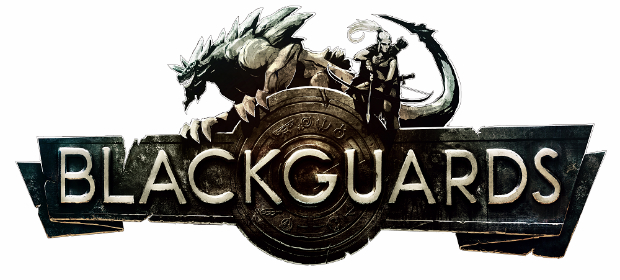Daedalic Entertainment are well known in the video game world for their use of the medium to tell interesting and thoughtful stories. In the past that’s been through the genre of point and click adventure games, but when I saw at E3 2013 that the company was hard at work on a turn-based strategy RPG, I knew I had to keep my eyes on it; the idea of a story-driven RPG with strategic combat was extremely appealing.
The story of Blackguards starts as Princess Elanor is viscously murdered by a hungry wolf. As the only person in the area when the guards come across the body, you’re naturally arrested for the crime and flung into prison to await your fate. That fate soon includes escaping with the help of a few unexpected friends in the form of the Dwarf Naurim and the Mage Zurbaran, and then you’re off on your quest to discover the truth about what exactly happened on that fateful night – hopefully clearing your name in the process.
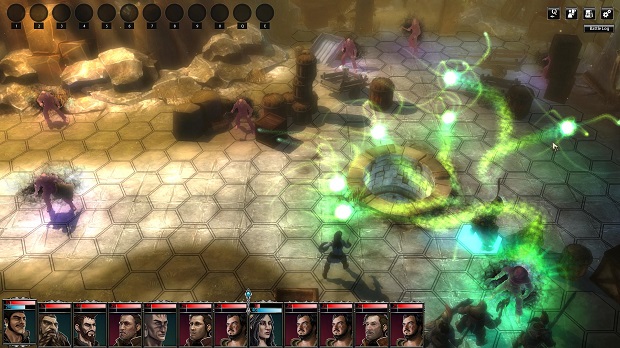
The story feels a little bit clichéd for the most part, but it’s well written, well told and well acted. There are a couple of stand-out characters (Naurim for one) but each person brings something to the game’s world to ensure that their involvement in it is almost required for your enjoyment. There is a good number of twists and turns in the story, some of which you’ll be able to see a mile off if you’re paying enough attention, but some that will come straight out of left field. Daedalic Entertainment have managed to show with their previous games that they know exactly how to spin a good yarn, and Blackguards allows them to showcase their talents yet again, albeit on a slightly different stage.
Blackguards isn’t bad in the visual department, as long as you’re not looking at it too closely. From the default zoom level, while you’re in the midst of a battle, you won’t notice anything massively out of place. However, get close to the action – during any of the cutscenes, for example – and you’ll notice that things perhaps aren’t quite up to standard. The characters’ lips don’t move to the words they’re saying, the models look jagged and angular, and you’ll see a lot of them repeated over and over again. This last part is more forgiveable than the rest though, given that you’ll often find yourself in dungeons and a lot of very similar environments. It’s not a terrible looking game, and the slight lapse in the aesthetics at least ensures that Blackguards runs quite well on even some of the more ageing computers and, at the end of the day, I’d rather have a game that doesn’t look great but works well.
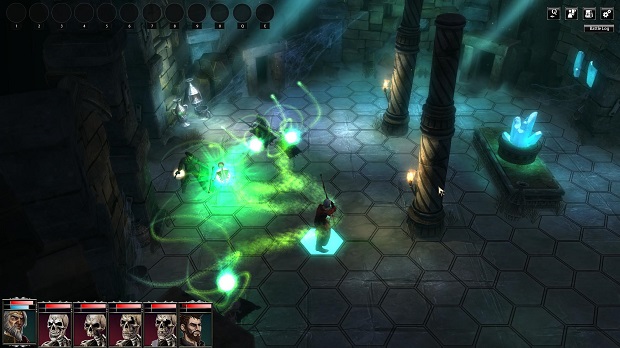
As previously mentioned, the audio in Blackguards is rather impressive for the most part. The ambiance created through the use of audio enables you to really invest yourself in the game’s world, and the quality of the voice-acting doesn’t take the play back out of that immersion. Some of the lines of dialogue are leant on a little bit too hard, making something that’s supposed to be serious and ominous come across as comical and silly. This only happens rarely though, and most of the time you’ll be too engrossed in both the story and the voice-acting to notice it.
The combat in Blackguards is turn-based, so thankfully you’ll have a little bit of time to think about your moves before you commit to them. You have the ability to place the members of your party in the perfect positions (or at least what you think is the perfect position) in an attempt to take down the enemy players before they do the same to you. If the enemy manages to take out all of your characters, then you better be prepared to do the whole fight over again.
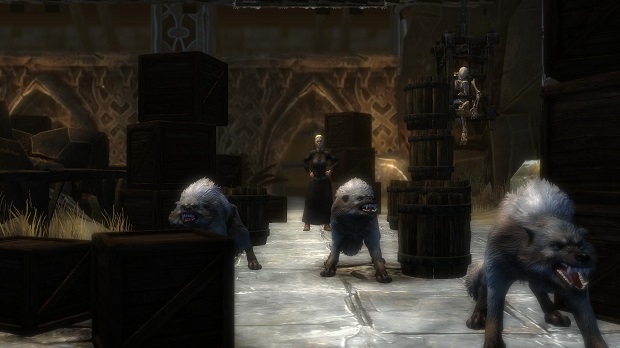
One of the more interesting aspects of the combat in Blackguards comes from the fact that you can interact with the environment in order to defeat the enemies in the vicinity (as long as they’re in very specific spots). For example, there may be a light fixture hanging from the ceiling, secured by but a single rope attached to the wall where you’re standing. If you can lure some of the enemies over towards you, you can click on the rope attached to the wall to cut it, and send the chandelier crashing down onto the heads of the guys who were just about to skewer you. It may sound simple, but it’s undoubtedly one of the most satisfying things you can do in combat.
One of the biggest downsides to the way that Blackguards is played comes from the inventory system. As with any other RPG, there is a hell of a lot of items that you’ll be picking up from completing quests and finishing dungeons, items that will soon fill up all the slots of your inventory. This isn’t always a bad thing – when you’ve got up to five party members to kit out, a little bit of variety in what they’re wearing and how powerful they are goes a long way – but with no easy way to compare the item you’ve picked up to the item you’re currently wearing, you’ll be inside the inventory system for a long time trying to figure out if the new pair of boots you’ve picked up is actually better or not.
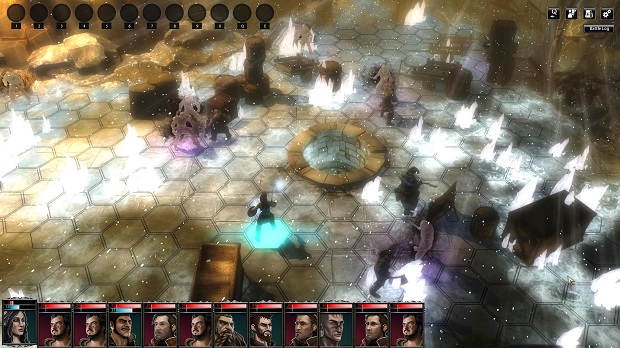
There’s really no reason to play through Blackguards again once you’ve completed the main story. With no multiplayer and no collectables you’ll really just be playing it to experience the story and perhaps take a different route to your goal or figuring out which objects in the environment you can use to your advantage. It’s a fun game, on the whole, but there isn’t much to draw you back for a repeat playthrough.
VERDICT: Blackguards is a nice change of pace from the Deadelic. The story is well told, if a little bit clichéd, and the slightly sub-par visuals are off-set by the interesting and addictive gameplay. It does suffer from a common strategy game issue, whereby if you fail at something, it can be hard to motivate yourself to spend another hour doing it all over again straight away. Play it in short bursts, however, and you could find yourself spending many an intriguing hour in Blackguard’s universe.

DECENT. A 6/10 indicates that, while this game could be much better, it still has a fair amount to offer the player. It might be an interesting title sabotaged by its own ambition, or a game denied greater praise by some questionable design choices. Don’t avoid it outright, but approach it with caution.
Review code provided by publisher.


